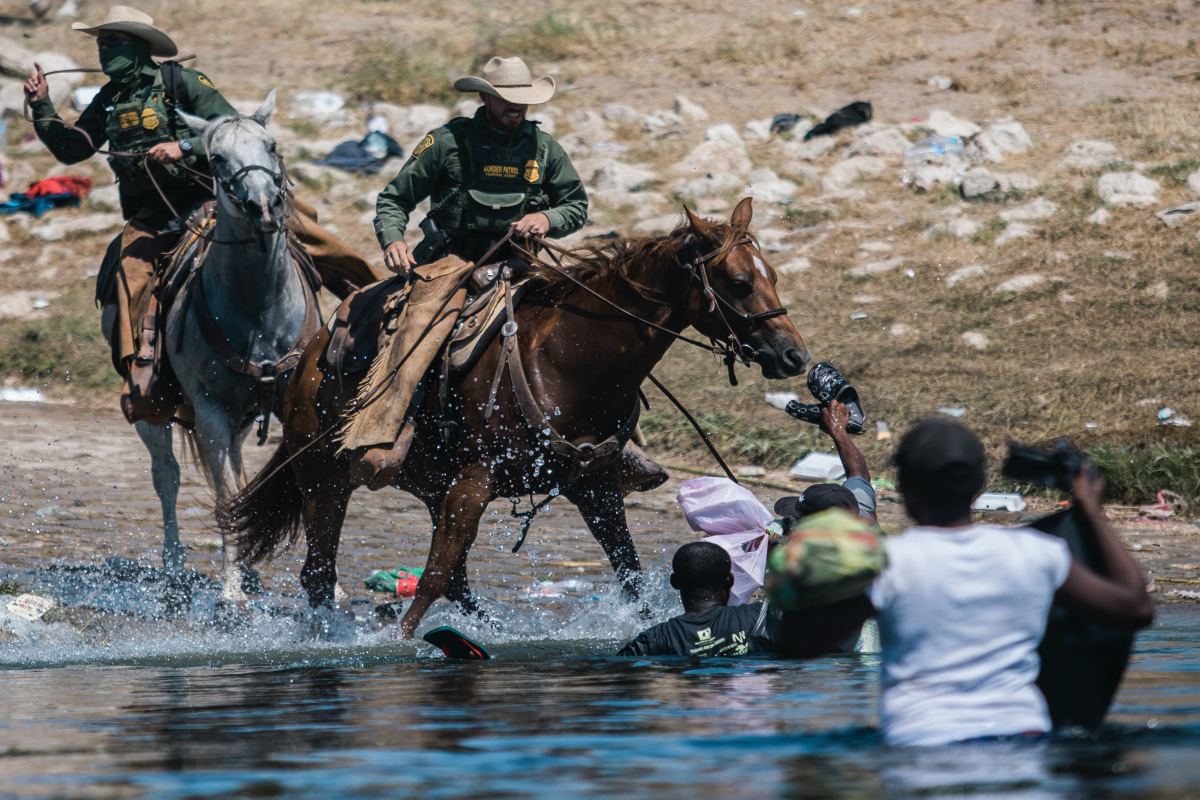

In this Sept. 19, 2021, file photo, U.S. Customs and Border Protection mounted officers attempt to contain migrants as they cross the Rio Grande from Ciudad Acuña, Mexico, into Del Rio, Texas. (AP Photo/Felix Marquez)
By Alana M.W. LeBrón and William D. Lopez
We have all seen the images of U.S. Border Patrol agents on horseback whipping Haitian migrants as they carry food back to their families on the U.S. side of the border. This image is a stark reminder of the U.S. history of violent policing of people of color, calling to mind images of U.S. police on horseback chasing escaped slaves and Western cowboys participating in the genocide of Indigenous peoples. This image is a glaring snapshot into the United States’s sordid history of police and vigilantes upholding white supremacy and enacting state-sanctioned violence, sometimes against Mexican and Central American immigrants, other times against Indigenous peoples, and this time, like so many times in our history, against Black people.
Haitian migrants are seeking refuge in the U.S. following an incredibly tumultuous period, which includes the ongoing COVID-19 pandemic, the recent assassination of Haitian President Jovenel Moïse, a 7.2 magnitude earthquake, and a tropical storm that killed more than 2,200 Haitians –all within a matter of weeks. Meanwhile, the Biden administration has escalated deportation flights to Haiti, treating a humanitarian crisis as one of national security. Biden has continued to use one of Trump’s most contentious enforcement tools to expel migrants as quickly as possible, Title 42, which cites the pandemic as a reason for sending migrants back home without the opportunity to request asylum. Coincidentally, the current rate of COVID-19 cases per capita in the U.S. is five times higher than in Mexico, and 190 times higher than in Haiti.
As public health scholars who study immigration enforcement, we can attest that U.S. institutions have a long legacy of justifying the mistreatment of immigrants, most often immigrants of color, through the targeted use of public health policy. For instance, in the early 20th century, U.S. Public Health Service officers conducted intrusive physical exams at the U.S.-Mexico border and subjected immigrants to baths with harmful chemicals, all under the guise of public health. Public health has justified these horrific immigration enforcement and surveillance efforts based on the historic and ongoing dehumanization of migrants and concern about the spread of infectious disease from said migrants.
In public discourse, deportation has often been racialized as a Latino issue, while police violence and incarceration are often seen as an issue affecting Black communities. The image of the Border Patrol agent using a horse’s reign to whip a fleeing Haitian immigrant pleading asylum on the U.S.-Mexican border is a stark reminder that immigration enforcement is yet another dimension of the U.S. system of anti-Black racism. Day-to-day discourse and immigration advocacy can succumb to the racial politics of the U.S. by overlooking the experiences of Afro-Latinos and Black migrants and by incorporating the very same anti-Black racism that plagues U.S. institutions. These images of Haitian asylum seekers are a glaring reminder of the interconnectedness of Black, Indigeneous and other communities of color, and the need for racial solidarity.
As Texans, Latinxs, and public health professionals, we heed the call by immigration advocacy movement leaders and amplify their demands to immediately stop the deportations of Haitian migrants and end the use of Title 42, which uses the pandemic to justify expelling migrants from the border and strips them of their rights to seek asylum at ports of entry. Additionally, we amplify calls for the U.S. to establish a temporary protected status for Haitian migrants and collaborate with non-governmental organizations to ensure that Haitians have access to appropriate legal services.
Now is the time to defund and divest from Homeland Security, including Customs and Border Protection and Immigration and Customs Enforcement. Instead, we should invest some of Homeland Security’s multi-billion dollar annual budget into creating viable pathways for legalization and public health approaches that invest in family and community unity and well-being, as well as fund and make available wrap-around psychological, social work and medical support to arriving migrants.
***
Alana M.W. LeBrón is an assistant professor of Health, Society, and Behavior and Chicano/Latino Studies at the University of California Irvine. Twitter: @alana_lebron
William D. Lopez is a clinical assistant professor at the University of Michigan School of Public Health and the author of Separated: Family and Community in the Aftermath of an Immigration Raid. Twitter: @lopez_wd


